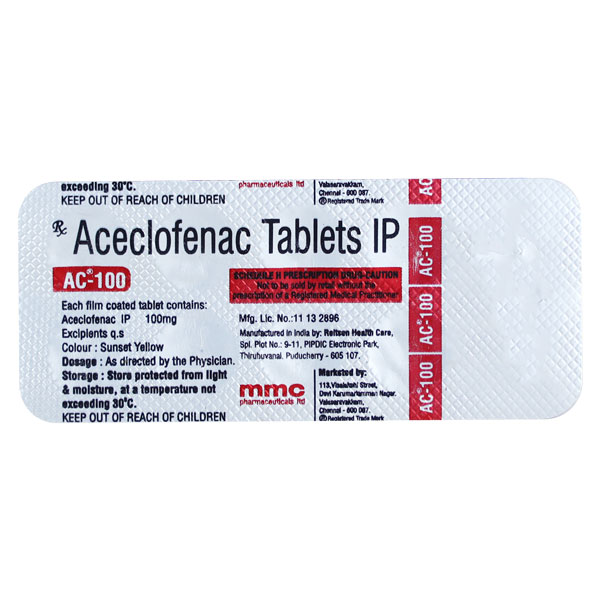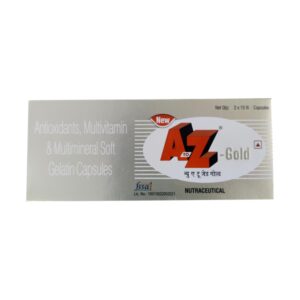Product Introduction:
AC 100MG TABLET is a non-steroidal anti-inflammatory drug (NSAID) used to relieve pain and inflammation associated with various conditions. It is commonly prescribed for musculoskeletal disorders and certain inflammatory conditions.
AC 100MG TABLET should be taken in the dose and duration as advised by your doctor. It should be taken with food or milk to prevent stomach upset. Taking the medicine regularly at the right times increases its effectiveness. It is important to keep taking the medicine regularly until your doctor tells you it is safe to stop.
Vomiting, stomach pain, nausea, and indigestion are some of the common side effects of taking this medicine. It may also cause dizziness, drowsiness, or visual disturbances. Your doctor may regularly monitor your kidney function, liver function, and levels of blood components if you are taking this medicine for long-term treatment. Long-term use may lead to serious complications such as stomach bleeding and kidney problems. AC 100MG TABLET is not recommended if you are pregnant or breastfeeding.
Uses:
- Pain Relief: AC 100MG TABLET is used to alleviate pain in conditions such as osteoarthritis, rheumatoid arthritis, ankylosing spondylitis, and other musculoskeletal disorders.
- Anti-inflammatory: It helps reduce inflammation associated with joint disorders and other inflammatory conditions.
Benefits:
- Pain Management: AC 100MG TABLET provides relief from pain, making it easier for individuals with arthritis or other inflammatory conditions to perform daily activities.
- Anti-inflammatory Effects: By reducing inflammation, it contributes to improved joint function and mobility.
Side Effects:
Common side effects may include:
- Gastrointestinal discomfort: This may include stomach pain, indigestion, or nausea.
- Dizziness or headache
- Skin rash or itching
Serious side effects are rare but can include gastrointestinal bleeding or ulcers. Long-term use may be associated with an increased risk of cardiovascular events.
Drug Interactions:
AC 100MG TABLET may interact with other medications. It’s important to inform your healthcare provider about all the drugs you are taking, including prescription, over-the-counter, vitamins, and herbal supplements. It may interact with other NSAIDs, anticoagulants, and certain blood pressure medications.
Dosage:
The typical dosage of AC 100MG TABLET is usually determined by a healthcare professional based on the specific condition being treated, the severity of symptoms, and the individual patient’s response. It is generally taken orally with or after food to minimize the risk of gastrointestinal irritation.
Working:
AC 100MG TABLET works by inhibiting the activity of cyclooxygenase (COX) enzymes. These enzymes play a role in the production of prostaglandins, which are substances that contribute to inflammation, pain, and fever. By inhibiting COX, AC 100 MG TABLET reduces the production of prostaglandins, leading to decreased inflammation and pain.
Precautions:
- Gastrointestinal Risk: Long-term use of NSAIDs like AC 100MG TABLET can increase the risk of gastrointestinal bleeding or ulcers. It is often prescribed with gastroprotective agents.
- Cardiovascular Risk: Individuals with a history of cardiovascular disease should use AC 100MG TABLET with caution, as it may be associated with an increased risk of cardiovascular events.
It’s important to use AC 100MG TABLET under the guidance of a healthcare professional. They can provide personalized advice, monitor for side effects, and make adjustments to the treatment plan as needed. If you experience any unusual or severe side effects, contact your healthcare provider promptly.
SAFETY ADVICE

Alcohol

Pregnancy

Breast feeding

Driving

Kidney
Use of AC 100mg Tablet is not recommended in patients with severe kidney disease.

Liver
Use of AC 100mg Tablet is not recommended in patients with severe liver disease. Regular monitoring of liver function tests is advisable while the patient is taking this medicine.
| Weight | 0.5 kg |
|---|---|
| Dimensions | 10 × 10 × 10 cm |




